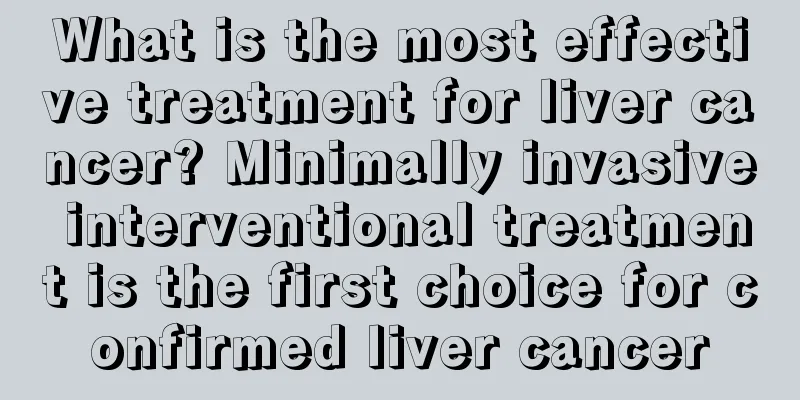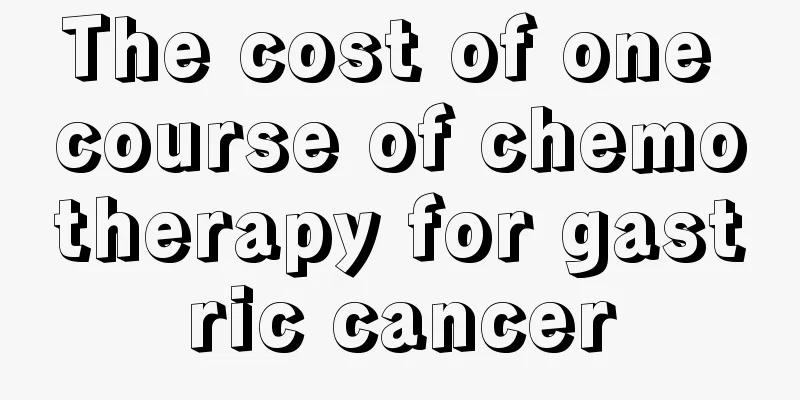What is the most effective treatment for liver cancer? Minimally invasive interventional treatment is the first choice for confirmed liver cancer

|
There are about 300,000 new liver cancer patients in my country every year, and the number is increasing at a rate of 5% per year. Studies have shown that more than 90% of liver cancer patients in my country develop on the basis of hepatitis B or hepatitis C, and 83.6% of liver cancer patients have liver cirrhosis. Since the liver has no nerves, patients only feel pain when liver tumors erode surrounding organs and blood vessels. Clinically, 80% of liver cancer patients have reached the middle and late stages when diagnosed, and have lost the possibility of conventional surgical treatment. Minimally invasive surgery for liver cancer is performed under the guidance of images, so it has the characteristics of small surgical trauma, precise positioning, light pain for patients, quick effect, small side effects, and fast postoperative recovery. It greatly improves the indications for surgery and significantly improves the tumor-free survival rate of patients. At present, clinical minimally invasive surgery for liver cancer has accumulated mature experience, and about 80% of liver cancer patients can receive minimally invasive surgery. There are many ways to treat liver cancer with minimally invasive surgery, one of the important means is vascular intervention chemotherapy embolization. For patients with a history of chronic liver disease or cirrhosis. If liver cancer is confirmed and the lesions are limited to the liver, no matter the size or number of the tumors, radiological intervention is necessary. Radiological intervention can detect all lesions in the liver through angiography. Local perfusion chemotherapy can cause a much stronger attack on the liver tumor than systemic chemotherapy. Iodized oil embolization can block the blood supply to the tumor and cut off the nutrition supply to the tumor. At least the condition can be controlled in a short period of time. Time is bought for other treatments. How long the effect of iodized oil embolization can last depends on the patient's age and liver condition. When the patient is young, the blood vessels are easy to be revascularized. That is, new blood vessels grow, forming collateral circulation, taking away the iodized oil, and the effect of embolization disappears. If there is no cirrhosis, young people have strong regenerative ability, and new blood vessels will form in about 20 days. For people over 40 years old, if they also have cirrhosis. The effect of embolization may last for 2 to 3 months. Therefore, radiological interventional therapy is more effective for patients over 40 years old than for patients around 30 years old. Radiological interventional therapy can be repeated. However, the stimulation of local high-concentration chemotherapy, the radiation damage caused by radiological operation, and the local ischemia caused by iodized oil embolism will affect liver function. Therefore, liver protection treatment after radiological interventional therapy is indispensable. Radiological interventional therapy, which reduces liver function damage to a minimum, is effective for patients with lesions limited to the liver. The extension of survival is obvious. There are many patients over 40 years old who survive for more than two years. Therefore, radiological interventional therapy should be the first choice for the treatment of liver cancer confined to the liver. Even if the lesion has invaded outside the liver, if the patient is in good general condition and has no ascites, and the doctor determines that the catheter can be inserted into the hepatic artery, radiological interventional therapy should be performed first. The primary lesion can be initially controlled, and the patient's overall condition will be further improved. Other methods can then be used to treat lesions throughout the body. |
Recommend
How to remove scale from a water dispenser
Water dispenser is a drinking water appliance, wh...
Are oranges diuretic?
Eating more fruits has many benefits for the body...
How to check for breast cancer? Six common methods for checking for breast cancer
Once breast cancer occurs, it will endanger women...
Why is one of my heels numb?
In most cases, people will experience some physic...
Does bad breath and bitter taste mean stomach cancer?
Gastric cancer is a malignant tumor of the digest...
The calories in two bowls of rice
In the southern region, rice is the main staple f...
Can I take a shower if I'm sweaty?
In the summer, many people like to take a cold sh...
The harmfulness of fruit cigarettes
Many people who are in the stage of quitting smok...
How many years does it take for endometrial cancer to develop
Endometrial cancer doesn't develop overnight....
How to judge whether it is a tooth cavity or a polyp
Everyone knows that polyps can grow on many parts...
The causes of right rib pain are actually these
There are many organs under the right ribs, such ...
Can I exercise if my lung cancer has metastasized to my bones?
Can I exercise if I have lung cancer bone metasta...
Tips to relieve leg pain from standing for a long time
The first thing students do when they enter unive...
What are the symptoms of hamartoma
The incidence of hamartoma has been on the rise i...
What medicine treats gallbladder cancer
Gallbladder cancer is divided into primary gallbl...









